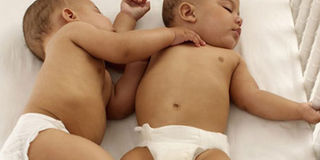Study highlights high death risk for Africa twins

One in five children born with a twin sibling in sub-Saharan Africa dies before the age of five — three times the rate among singletons, said a study Thursday. PHOTO | FILE
What you need to know:
- Under-five mortality of single-borns in the region halved over the period, but declined by about a third for twins, the researchers found.
- The trend is not unique — twins globally are two to five times less likely than singletons to make it to the age of five, depending on where they are born, the researchers said.
- Twin births are much more common in sub-Saharan Africa than anywhere else in the world, with about three or four percent of children belonging to a twin pair, the researchers said.
One in five children born with a twin sibling in sub-Saharan Africa dies before the age of five — three times the rate among singletons, said a study Thursday.
Almost two-thirds die in the first month of life — often succumbing to the after-effects of a difficult birth or entering the world too early or underweight, according to research published in The Lancet medical journal.
And while rates of under-five deaths in the sub-Saharan African region have declined over two decades, the improvement has been much slower for twins than for single-borns.
"Twins account for 10.7 percent of all under-five deaths and 15.1 percent of neonatal (newborn) deaths in the region and these percentages are increasing," the study said.
"The total number of twins dying before five years of age is estimated at about 315,000 per year."
The researchers used data on 1.69 million children born in 30 sub-Saharan African countries between 1995 and 2014.
They included 56,597 twins.
Under-five mortality of single-borns in the region halved over the period, but declined by about a third for twins, the researchers found.
The trend is not unique — twins globally are two to five times less likely than singletons to make it to the age of five, depending on where they are born, the researchers said.
Twin births are much more common in sub-Saharan Africa than anywhere else in the world, with about three or four percent of children belonging to a twin pair, the researchers said.
But pregnant women in the region are also much less likely to receive antenatal care or deliver their offspring in a medical setting.
"What needs to be done is prioritising early diagnosis of twin pregnancies and increasing facilities for women with twins to give birth in a hospital," study co-author Christiaan Monden of the University of Oxford told AFP.
"Obviously to achieve the latter there are financial as well as cultural challenges."
The true rate of twin deaths is likely to be even higher than in the study, the authors noted. When a twin is stillborn, its sibling is commonly registered as a singleton birth, which could skew the global picture.





